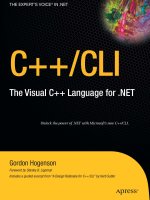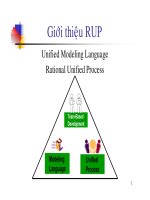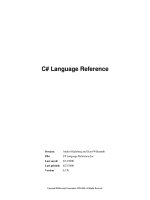general purpose language ruby
Bạn đang xem bản rút gọn của tài liệu. Xem và tải ngay bản đầy đủ của tài liệu tại đây (865.25 KB, 24 trang )
General Purpose Language
General Purpose Language
Ruby
Ruby
Kit Chan
Kit Chan
COMP3351
COMP3351
Programming Languages
Programming Languages
November 9, 2007
November 9, 2007
Outline
Outline
Reference
Reference
Introduction
Introduction
Ruby is
Ruby is
Features
Features
Array
Array
Loop
Loop
Ruby v.s. Java
Ruby v.s. Java
Duck Typing
Duck Typing
Dynamic Typing
Dynamic Typing
Type Tag Checking
Type Tag Checking
Functional Programming
Functional Programming
Reference
Reference
Wikipedia
Wikipedia
/> /> /> />
Ruby Official Website
Ruby Official Website
/> />
Learning Ruby
Learning Ruby
/> />
Duck Typing
Duck Typing
/> />
Introduction
Introduction
Developed by Yukihiro “Matz” Matsumoto, in Feb, 1993
Developed by Yukihiro “Matz” Matsumoto, in Feb, 1993
First released in 1995
First released in 1995
1.8.6 Ruby 1.9 developed March, 2007
1.8.6 Ruby 1.9 developed March, 2007
Named
Named
As a gemstone because of a joke with in Matsumoto’s friends alluding to
As a gemstone because of a joke with in Matsumoto’s friends alluding to
Perl’s name
Perl’s name
Ruby is
Ruby is
Cross-platform Operating System
Cross-platform Operating System
Combines syntax by
Combines syntax by
Perl
Perl
Smalltalk-like OO features
Smalltalk-like OO features
Shares features with
Shares features with
Lisp
Lisp
Python
Python
Dylan
Dylan
CLU
CLU
Ruby is
Ruby is
The interpreted scripting language for
The interpreted scripting language for
Quick
Quick
Easy OO programming
Easy OO programming
designed for programmer productivity
designed for programmer productivity
Straight-forward
Straight-forward
principle of least surprise (POLS)
principle of least surprise (POLS)
Ruby behaves in a way that minimizing confusion for
Ruby behaves in a way that minimizing confusion for
experienced users
experienced users
After you learn Ruby very well
After you learn Ruby very well
Ruby is
Ruby is
Obedient
Obedient
>> 'Hello World'
>> 'Hello World'
=> "Hello World”
=> "Hello World”
>> 'blink ' * 4
>> 'blink ' * 4
=> "blink blink blink blink "
=> "blink blink blink blink "
Your Calculator
Your Calculator
>> 1+1
>> 1+1
=> 2
=> 2
Or
Or
>> 2**2**2
>> 2**2**2
=> 16
=> 16
Features
Features
Object-oriented
Object-oriented
Four levels of variables:
Four levels of variables:
Global
Global
$var
$var
Instance
Instance
@var
@var
Local
Local
[a-z] or _; var
[a-z] or _; var
Constant
Constant
[A-Z]
[A-Z]
Exception handling
Exception handling
Iterators & closures
Iterators & closures
Automatic garbage collecting
Automatic garbage collecting
Highly portable
Highly portable
/> />
Array
Array
>> numbers = ["zero", "one", "two", "three", "four"]
>> numbers = ["zero", "one", "two", "three", "four"]
=> ["zero", "one", "two", "three", "four"]
=> ["zero", "one", "two", "three", "four"]
=> Array
=> Array
>> numbers[0]
>> numbers[0]
=> "zero"
=> "zero"
What arrays do?
What arrays do?
>> numbers[0].class
>> numbers[0].class
=> String
=> String
>> numbers[0].upcase
>> numbers[0].upcase
=> "ZERO"
=> "ZERO"
>> numbers[0].reverse
>> numbers[0].reverse
=> "orez"
=> "orez"
Loop
Loop
If I knew Ruby when I was in grade school…….
If I knew Ruby when I was in grade school…….
>> 100.times do
>> 100.times do
puts "I won't do that again"
puts "I won't do that again"
end
end
I won't do that again
I won't do that again
=> 100
=> 100
My life was going to be much easier
My life was going to be much easier
Ruby v.s. Java- Syntax
Ruby v.s. Java- Syntax
begin_time = Time.now.to_i
begin_time = Time.now.to_i
i = 0
i = 0
100.times do
100.times do
i += 1
i += 1
j = 0
j = 0
10.times do
10.times do
j += 1
j += 1
k = 0
k = 0
100.times do
100.times do
k += 1
k += 1
puts i.to_s + " + " + j.to_s + " + " + k.to_s
puts i.to_s + " + " + j.to_s + " + " + k.to_s
end
end
end
end
end
end
end_time = Time.now.to_i
end_time = Time.now.to_i
difference = end_time - begin_time
difference = end_time - begin_time
puts "It took " + difference.to_s + " seconds"
puts "It took " + difference.to_s + " seconds"
ho = gets
ho = gets
class test
{
public static void main(String[] args)
{
long startTime = System.currentTimeMillis();
for (int i=0; i<=100 ; i++ )
{
for (int j=0; j<=10 ; j++)
{
for (int k=0; k<=100 ; k++ )
{
System.out.println( i + " + " + j + " + " + k);}}}
long endTime = System.currentTimeMillis();
long difference = (endTime - startTime)/1000;
System.out.println("It took " + difference + "
seconds");
}
}
Ruby v.s. Java
Ruby v.s. Java
Performance
Performance
Ruby: 24 – 26 seconds
Ruby: 24 – 26 seconds
Java: 1 – 2 seconds
Java: 1 – 2 seconds
Language
Language
Paradigm
Paradigm
Type
Type
Checking
Checking
Java
Java
Imperative
Imperative
Object-oriented
Object-oriented
Generic
Generic
Static
Static
Ruby
Ruby
Imperative
Imperative
Object-oriented
Object-oriented
Functional
Functional
Aspect-oriented
Aspect-oriented
Dynamic
Dynamic
(duck)
(duck)
Duck Typing
Duck Typing
Ruby interpreter is happy to treat it as it were a duck
Ruby interpreter is happy to treat it as it were a duck
If an object walks and talks like a duck
If an object walks and talks like a duck
Duck typing means
Duck typing means
An object type is defined by what it can do
An object type is defined by what it can do
Not by what it is
Not by what it is
Duck typing refers to
Duck typing refers to
less concerned with the class of an object
less concerned with the class of an object
more concerned with what methods can be called on it
more concerned with what methods can be called on it
what operations can be performed
what operations can be performed
Duck Typing
Duck Typing
we use respond_to?
we use respond_to?
Example
Example
>> puts ('A string'.respond_to? :to_str)
>> puts ('A string'.respond_to? :to_str)
true
true
=> nil
=> nil
>> puts (Exception.new.respond_to? :to_str)
>> puts (Exception.new.respond_to? :to_str)
true
true
=> nil
=> nil
If an object quacks like a duck, just treat it as a
If an object quacks like a duck, just treat it as a
duck….
duck….
We should treat objects to the methods they define
We should treat objects to the methods they define
Duck Typing
Duck Typing
>> class Duck
>> class Duck
def quack
def quack
'Quack!'
'Quack!'
end
end
def swim
def swim
'Paddle paddle paddle '
'Paddle paddle paddle '
end
end
end
end
=> nil
=> nil
>> class Goose
>> class Goose
def honk
def honk
'Honk!'
'Honk!'
end
end
def swim
def swim
'Splash splash splash '
'Splash splash splash '
end
end
end
end
=> nil
=> nil
>>
>>
Duck Typing
Duck Typing
>> class DuckRecording
>> class DuckRecording
def quack
def quack
play
play
end
end
def play
def play
'Quack'
'Quack'
end
end
end
end
=> nil
=> nil
>>defmake_it_quack(duck)
duck.quack
end
=> nil
>>putsmake_it_quack(Duck.new)
Quack!
>>putsmake_it_quack(DuckRecording.new)
Quack
=> nil
>> def make_it_swim(duck)
duck.swim
end
=> nil
>>putsmake_it_swim(Duck.new)
Paddlepaddlepaddle
=>nil
>>putsmake_it_swim(Goose.new)
Splashsplashsplash
=> nil
Add Method to Class Instances
Add Method to Class Instances
Add methods to individual class instances
Add methods to individual class instances
class Duck
class Duck
def quack
def quack
puts 'Quack!'
puts 'Quack!'
end
end
def swim
def swim
puts 'Paddle paddle paddle '
puts 'Paddle paddle paddle '
end
end
end
end
d = Duck.new #create new instance of the class
d = Duck.new #create new instance of the class
d.quack
d.quack
#call method
#call method
d.swim
d.swim
#call method
#call method
def d.walk
def d.walk
#override existing method with
#override existing method with
#new functionality
#new functionality
puts 'I am walking walking'
puts 'I am walking walking'
end
end
d.walk
d.walk
=> nil
=> nil
=> #<Duck:0x6cc7ddc>
=> #<Duck:0x6cc7ddc>
Quack!
Quack!
=> nil
=> nil
Paddle paddle paddle
Paddle paddle paddle
=> nil
=> nil
=> nil
=> nil
I am walking walking
I am walking walking
=> nil
=> nil
irb(main):022:0>
irb(main):022:0>
Dynamic Typing
Dynamic Typing
Ruby, the data types are not wholly declared on variable
Ruby, the data types are not wholly declared on variable
Data associated with variables are not known until the time of execution
Data associated with variables are not known until the time of execution
Advantage:
Advantage:
flexibility
flexibility
Less work for the programmer
Less work for the programmer
Type Tag Checking
Type Tag Checking
Ruby is dynamically typed
Ruby is dynamically typed
it supports run-time dispatch on tagged data
it supports run-time dispatch on tagged data
Takes place at run-time
Takes place at run-time
values bound in variables can acquire different tags depending on the
values bound in variables can acquire different tags depending on the
execution path
execution path
Example
Example
var x
var x
#declares the name x
#declares the name x
x :=1
x :=1
#associates int val 1 to name x
#associates int val 1 to name x
x :=“hi”
x :=“hi”
#associates the string val “hi” to name x
#associates the string val “hi” to name x
……………
……………
illegal
illegal
binding x to values of inconsistent type
binding x to values of inconsistent type
Pure Dynamically typed system allows the execution
Pure Dynamically typed system allows the execution
Type tags are attached to values
Type tags are attached to values
Dynamic typing catches errors during program execution
Dynamic typing catches errors during program execution
Example cont
Example cont
Dynamic typing keeps all program values “tagged”
Dynamic typing keeps all program values “tagged”
Checks the tag before using any value in an operation
Checks the tag before using any value in an operation
var x :=1
var x :=1
#binds val 1 to x
#binds val 1 to x
var y := “hi”
var y := “hi”
#binds val “hi” to y
#binds val “hi” to y
var z := x + y
var z := x + y
#add x to y
#add x to y
Example cont
Example cont
The value bound to x be a pair (integer, 1)
The value bound to x be a pair (integer, 1)
The value bound to y be a pair (string, “hi”)
The value bound to y be a pair (string, “hi”)
Attempts to execute the 3
Attempts to execute the 3
rd
rd
line,
line,
Checks the type tags integer and string
Checks the type tags integer and string
If the operation + (addition) is not defined
If the operation + (addition) is not defined
An error is signaled
An error is signaled
Why Ruby?
Why Ruby?
High productivity for programmers
High productivity for programmers
Execution time is not the main concern
Execution time is not the main concern
Web Developments
Web Developments
Projects like Ruby on Rails
Projects like Ruby on Rails
Functional Programming
Functional Programming
Paradigm treats computation as the evaluation of mathematical
Paradigm treats computation as the evaluation of mathematical
functions
functions
Emphasize on application of functions
Emphasize on application of functions
Largely being used in academia
Largely being used in academia
Lambda calculus
Lambda calculus
Forms the foundation for most models of functional programming
Forms the foundation for most models of functional programming
Thank you !!
Thank you !!









